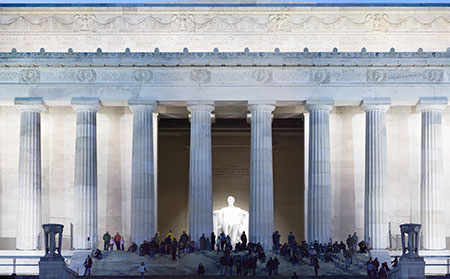by WorldTribune Staff, August 28, 2022
Thinking of posting that video you took at the Lincoln Memorial or Yosemite National Park on your YouTube channel?
Think again.

You are required to pay a permit fee to the National Park Service if your video generates any revenue and possibly risk a jail sentence if you don’t pay up, the Foundation for Individual Rights and Expression (FIRE) said, citing a D.C. Circuit Court ruling.
The ruling poses a huge threat to the First Amendment, FIRE said.
“The court drew a bewildering distinction between the act of filming and other steps in ultimately communicating through film, holding that recording video ‘involves merely a noncommunicative step in the production of speech,’ ” FIRE said in a statement.
“The court’s conclusion runs counter to decades of case law finding that the process of filmmaking is expressive, and that the First Amendment equally protects the creation and dissemination of speech, both of which are essential for communication.”
Ronnie London, the general counsel for the FIRE, represented part-time independent filmmaker Gordon Price in his lawsuit against the National Park Service.
By the “logic” of the Park Service, and now the court, London said, “Backpackers who upload ‘van life’ footage of their travels to Instagram for ad revenue without a permit and paying a fee to the government deserve to be in jail.”
Price had done a film exploring unexplained events, and, alone, took a camera onto Colonial National Historical Park land for brief video clips.
The film, “Crawford Road,” was released and the Park Service ticketed Price for not having a permit and paying a fee.
A trial court threw out the case as a violation of the First Amendment but when Price then sued because he had been charged with a crime, the appeals court ruled 2-1 in a decision written by Judge Douglas H. Ginsburg that filming is not a protected expressive activity.
In a dissenting opinion, FIRE reported, Judge David S. Tatel found, “the Permit Regime applies to an extraordinarily broad group of people, ranging from large-scale filming operations, to small documentary film crews, to individuals who take short videos on their phones and later monetize this content on social media platforms.” He explained the majority’s decision means “that anything from recording commentary for YouTube to filming a protest on the National Mall could be illegal without a permit if the creator intends to profit from the footage.”
Judge Tagel continued: “Before standing outside Yosemite National Park’s visitor center using a cell phone to record commentary on our national parks that will air on an advertisement-supported YouTube channel, an individual must obtain a permit and pay a fee. “Before filming a protest on the National Mall, tourists must obtain a permit and pay a fee if they have an inkling that they might later make money from this footage…”
“Spontaneous” filming? Tagel said: “These individual will be criminally liable and face up to six months in prison…”
FIRE added: “The downstream implications of such a distinction are staggering: Ansel Adams would enjoy full First Amendment protection to exhibit his famous National Park photos, but not in taking them. A budding poet (the next Henry David Thoreau, perhaps?) heading off to the woods to write a book of poetry would be fully protected by the First Amendment in selling the book, but not in actually writing it.”
Action . . . . Intelligence . . . . Publish
